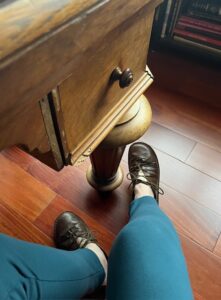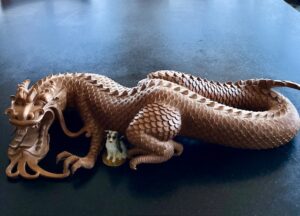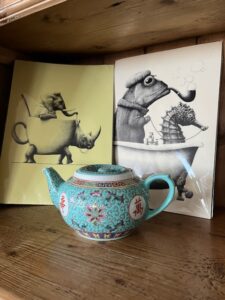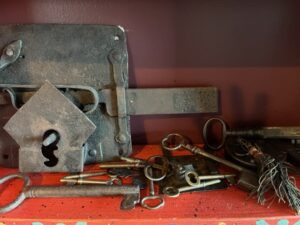
She taps her feet in harmonious rhythms as she taps the keys. Numbers swirl about her. She’s happy to produce figurative symbols in neat columns and rhythmic intervals.They are so much more manageable than the matters they stand for. The dancing bookkeeper remains oblivious to what her numbers represent—it’s music that swirls about her, and digital scratchings that appear on the screen before her like runic invocations.
She prefers illusion to reality but knows how important it is to keep count. Numbers behave and can be changed to suit circumstance—something she knows nothing about but sustains in memory for the potential of last refuge. She is given only digits to place in existing columns and the task of tallying them. Lately numbers have surged. She’s not intimidated by the growing numbers; she’s fascinated. She has only to expand the width of column and elaborate her tapping, both finger and foot.
She conducts a grand symphony of percussion.
Below her, in a ground-floor apartment, a young man moves to her rhythm—when he’s not jacked into his own network of data. He dresses, undresses, showers and performs personal activities to the cadence of her tapping, unaware of this synchronicity. She too is unaware of the percussive nature of their connection.
Occasionally each of them make their way into an unrhythmic outside world. For a long time, they do this separately as even the most synonymous tempo is not always precisely coordinated.
One day the dancing bookkeeper returns home just as the young man is leaving. As their paths cross, they recognize accord. By some mysterious internal mechanism that neither can explain, they are drawn into each other’s context. The result is new improvisation, periodic adaptation and adjustment.
The dancing bookkeeper circles the young man, she leaps and flexes.
He is transfixed.

“What do you want to be when you grow up?” As a child, the question confused and annoyed me. What did grown ups want to hear? Should I tell them I want to stay up late, eat ice cream for supper, live on my own island. Should I admit that I don’t want to be a teacher, nurse or secretary—which seemed to be the only careers for women at that time.
I wanted to be a pirate. I wanted to invent things and make up stories and tell other people what to do. My answer was, “wise. When I grow up I want to be wise” (unlike people who asked children stupid questions).
I thought wisdom was something that came with experience. My grandmothers were wise. My Aunt Francis was wise. The lady in the Polish deli was wise. They’d seen a lot in their time, knew about Life and how to talk to children like they were people. I wasn’t experienced enough to be wise. I’d have to be patient and keep my eyes and ears open.
Early on, experience came from books. My parents read to me and once I learned how, I read everything (school books, grudgingly). There was no direction or censorship in my family; any sort of reading was acceptable. When I got older, I listened to music. Local radio stations played early rock ’n roll, but if you drove up the mountain in the evening, you could get Chicago on the car radio. They played a wider range of rock and blues. My head was filled with words—lines from books and poetry, words to songs; an abundance of human experience. Words, phrases and tunes swirled in my head and, alas, left me even more bewildered.
I became a regular in the town library. The folks I met there were smarter and wiser than me. Their knowledge was organized by theory and proof; ideas in categories, order, and proper syntax. The world made sense to them in ways that eluded me. Some scorned the books that I loved—fantasy, adventure, MAD magazine. Some had patience to answer my questions and address my dilemma. Was I worthy of their time? Their kindness? Would I ever understand the world?
I had plenty of friends that weren’t so well read or respected by grown ups; folks that only read comics or didn’t read at all. They were easier to understand and still, they were infinitely wiser than me. They made sense of the world in ways I couldn’t. They eliminated unnecessary complexities and played by their own rules, simple rules, more basic than those of teachers and parents. “Don’t rat on your friends.” “Say what you mean.” “If you make a promise, keep it.” They were not confused.
But I still was.
After years of reading, listening, watching and doing; I realize that the world may never make sense to me. I have learned friends. I have street-smart friends. I have friends who are completely unhinged by most standards. They’ve taught me plenty, but…
I’ll never be “wise” in the reputable sense of the word despite age and experience. My knowledge is spotty and instincts are not always error-free. But each error is a lesson—large, small, or neutral and the underlying themes of the lessons are: not to take myself too seriously, and to expect surprise. This is the nature of my “wisdom” thus far, a kind of Trickster “logic” that’s ragged and dirty, laughable, and occasionally terrifying. I’m not the the sage atop the hill but the awkward coyote that stumbles about in the scree between landslides and avalanches in the company of glorious flowers, trees, clouds, birds of every color and tune, creatures—real and…maybe not so real. Some uncertainty is necessary in order to gain experience and I’m often uncomfortable weighing risk. Most days I take a deep breath and press on. So far I’ve survived the dangerous animals, poisonous plants, and unpredictable pitfalls that I stumble through. Everything comes with a lesson. Sometimes I’m laughed at, sometimes I laugh with others, mostly I laugh at myself.
In a year of dragons, I’m still a dog—lazing in the shade, scuttling off at the rustle of promise.
Gong Hey Fat Choi

My husband is experimenting to see how long Chinese food lasts in the refrigerator. It’s only been four days but I’ve decided to do my own experiment to see how infrequently I can open the fridge to avoid the stench of a deteriorating Chinese feast.
It’s amazing how many times a day I have to open the fridge even though I do my best not to.
Breakfast: I open for eggs that I poach and eat with dry toast. The bread comes from the freezer (a separate door). Hot ginger tea.
Lunch: I slip the spicy mayo out and add it to tuna, replace it stealthily. Room temperature water—from a room I purposefully leave the heat off for several hours. Pita chips.
Supper: salmon from the freezer. Rapid grab for Brussel sprouts and left-over cous cous. No return necessary for either. I top the fish with pantry staples—oil, pistachios. Room temperature red wine to ameliorate odoriferous distress.
I summon speed and stealth, wrap a scarf over my nose and mouth, hold my breath. Nevertheless…
In the cool darkness of the fridge, bean curd floats in an unnaturally shiny sauce, uneaten peppers fixed in the slough. Transparent snow peas saturated in a waxen pulse with lifeless clumps that may have once been shrimp, or paint chips floating in it. Bricks of rice. The plasticized miasma permeates asparagus and good Irish butter.
“Just needs a little duck sauce,” he insists.
By late evening I’m dreaming of dark chocolate that’s been unfairly incarcerated with the Chinese leavings. It should to be liberated before it accrues the odor.
I think of of that winter when the garbage froze under piles of ice and snow after several blizzards and didn’t thaw for a month, of the odor in a traditional Ainu tent, the rat’s nests under the carousel near the Eiffel Tower, the baked garbage and blood sacrifice in Katmandu.
When I was a kid, I wanted to be a pirate. I was told that girls couldn’t be pirates. I don’t agree with this rule but I had to abandon the dream because of my susceptibility to profound sea sickness.
My husband is no scientist. He does not preside over kitchen appliances—he barely notices them. I’m awake in the morning long before he is. Sanitation and rationality will triumph.

Once there was a little girl who looked around and decided that she was in no hurry to grow up.
But she did.
Then she got old—as some little girls do.
There were things she liked about being old and things she didn’t.
She didn’t like she had to get a tooth pulled and her hair was falling out. But she always liked hats and now was her chance…
She hated the foot doctor.
Mostly, she didn’t like the losses she’d had to face as she got older. She lost her parents and way too many friends. She lost her two favorite cousins. She didn’t like having to put her dogs “to sleep” after they’d been so patient and loyal to her. Loss was certainly the worst part of getting old. People disappeared, but the memories lingered. She assumed that was what people meant by being haunted. But being haunted wasn’t the worst thing if you let the bad parts drift off and kept the good memories. But you still had to live with loss.
She didn’t like where the world was going, but she didn’t want to be the cron who complains all the time.
She liked peanut butter and ice cream and all the good memories—even when they made her sad.
She wasn’t crazy about the fact that she’d forgotten many of the things she’d learned along the way, but she did like that those things were stowed away somewhere inside where they continued to influence her thoughts and decisions. She liked that she could trust her instincts. She liked that she didn’t feel she had to please anyone, that she could ask snoopy questions and people would attribute nosiness to her age and not be offended.
She was never offended when they didn’t answer, but she loved that they often did.
She liked water—but let’s not talk bathing suits.
She liked old trees, stars, and babies. She liked dogs. She didn’t like cats but there were certainly “cat people” that she liked very much.
She liked her faded orange shirt enough to mend a hole in the sleeve.
Living with loss wasn’t pleasant, but she was satisfied that she’d persevere; there were too many every-day wonders to appreciate.
Now, where did she leave her keys?